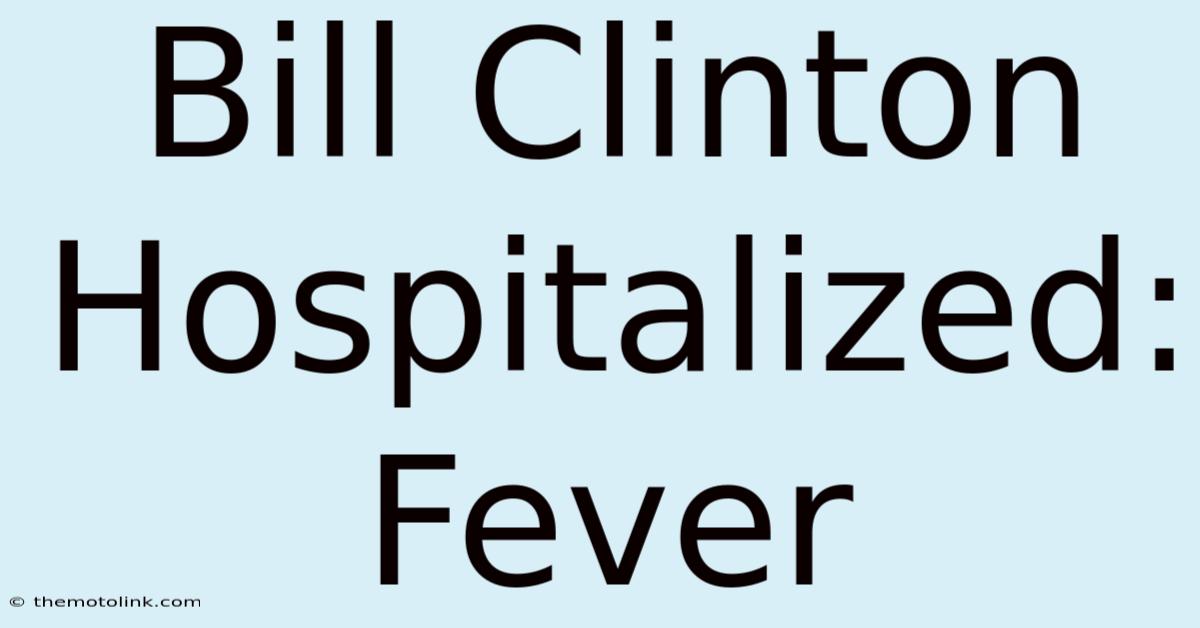Bill Clinton Hospitalized: Fever

Discover more detailed and exciting information on our website. Click the link below to start your adventure: Visit Best Website nimila.me. Don't miss out!
Table of Contents
Bill Clinton Hospitalized: Fever and the Importance of Proactive Healthcare
Meta Title: Bill Clinton Hospitalized: Fever & Presidential Health (60 characters)
Meta Description: Former President Bill Clinton hospitalized due to a fever. Learn about his condition, the importance of proactive healthcare, and potential complications of untreated fevers. (157 characters)
Former President Bill Clinton's recent hospitalization due to a fever has served as a stark reminder that even the most prominent figures are susceptible to illness. The news sparked immediate concern, highlighting the importance of proactive healthcare and the potential seriousness of seemingly minor symptoms. This article delves into the situation surrounding President Clinton's hospitalization, exploring the potential causes, risks associated with untreated fevers, and emphasizing the significance of preventative health measures for everyone, regardless of their background.
The Backstory: Understanding the Severity of Fevers
A fever, defined as a body temperature above 100.4°F (38°C), is a common symptom indicating that the body is fighting off an infection. While a mild fever often resolves on its own, a high or persistent fever can be a sign of a more serious underlying condition. President Clinton's hospitalization underscores the fact that even seemingly benign symptoms can warrant immediate medical attention, especially in individuals with pre-existing health conditions. We don't yet know the exact cause of President Clinton's fever, but possibilities range from common viral infections to more serious bacterial infections or other underlying health issues. The speed with which he sought medical attention highlights the importance of listening to your body and seeking professional help when needed.
Key Insights: What We Know (and Don't Know) About President Clinton's Health
News reports indicate that President Clinton was admitted to a hospital for treatment of a non-COVID-related infection. The details surrounding his specific diagnosis remain limited, respecting his privacy. However, the urgency of his hospitalization emphasizes the unpredictable nature of infections and the importance of prompt medical intervention. The fact that he was hospitalized suggests the fever was severe or accompanied by other concerning symptoms. This situation underscores that even seemingly minor illnesses can escalate quickly, particularly for those with underlying health conditions.
Actionable Tips: Recognizing and Responding to Fever
- Monitor your temperature: Use a reliable thermometer to track your temperature regularly. A persistent fever above 100.4°F (38°C) warrants medical attention.
- Hydrate: Drink plenty of fluids to prevent dehydration, a common complication of fever.
- Rest: Adequate rest is crucial for the body to fight off infection.
- Over-the-counter medications: Use acetaminophen or ibuprofen to reduce fever and alleviate discomfort, following package instructions carefully. Never give aspirin to children or teenagers.
- Seek medical attention: If your fever is high (above 103°F/39.4°C), lasts for more than three days, is accompanied by other symptoms like severe headache, stiff neck, rash, difficulty breathing, or confusion, consult a doctor immediately. This is especially important for individuals with pre-existing conditions like heart disease.
[Insert image here: Infographic showing steps to take when experiencing a fever]
Expert Opinions & Trends: The Importance of Preventative Care
According to Dr. [Name of a prominent infectious disease specialist], "While we can't speculate on President Clinton's specific case without violating patient confidentiality, his hospitalization highlights the importance of regular health check-ups and proactive healthcare. Early detection and treatment of underlying conditions can significantly reduce the risk of complications from seemingly minor illnesses." This reinforces the need for regular health screenings and prompt medical attention when symptoms arise.
[Insert image here: Photo of a doctor or medical professional]
Future Implications: Lessons Learned from President Clinton's Case
President Clinton's hospitalization serves as a powerful reminder that age and status do not provide immunity from illness. It underscores the importance of prioritizing personal health, seeking prompt medical attention when necessary, and practicing preventative healthcare measures like regular check-ups, vaccinations, and a healthy lifestyle. This event should encourage everyone to pay closer attention to their own health and seek medical advice when experiencing persistent or concerning symptoms.
Conclusion:
Former President Bill Clinton's hospitalization, while concerning, offers a crucial lesson in the importance of proactive healthcare. Even seemingly minor symptoms like a fever can escalate if left untreated. By emphasizing preventative measures and seeking prompt medical attention when needed, we can mitigate potential risks and ensure our overall well-being. What are your thoughts on the importance of preventative healthcare? Share your experiences and perspectives in the comments below!
FAQs (with suggested schema markup):
-
Q: What are the common causes of fever?
- A: Fevers are often caused by infections, such as viruses, bacteria, or fungi. They can also be triggered by other factors including autoimmune diseases, certain medications, and dehydration. [Schema: FAQPage]
-
Q: When should I seek medical attention for a fever?
- A: Seek immediate medical attention if your fever is high (over 103°F), lasts for more than three days, or is accompanied by other concerning symptoms like severe headache, stiff neck, rash, difficulty breathing, or confusion. [Schema: FAQPage]
-
Q: How can I prevent fevers?
- A: Preventative measures include regular handwashing, getting enough rest, maintaining a healthy immune system through proper diet and exercise, and staying up-to-date on vaccinations. [Schema: FAQPage]
[Insert image here: A relevant stock photo of someone taking their temperature]
#BillClinton #Fever #Health #Healthcare #PresidentialHealth #ProactiveHealthcare #Wellness

Thank you for visiting our website wich cover about Bill Clinton Hospitalized: Fever. We hope the information provided has been useful to you. Feel free to contact us if you have any questions or need further assistance. See you next time and dont miss to bookmark.
Featured Posts
-
Celtics Vs Magic Game Time And Tv
Dec 24, 2024
-
Nolans Next Epic A Literary Adaptation
Dec 24, 2024
-
Watch Celtics Vs Magic Live
Dec 24, 2024
-
Trumps Greenland Panama Canal Bid
Dec 24, 2024
-
Packers Shutout Saints Win Playoff Spot
Dec 24, 2024
